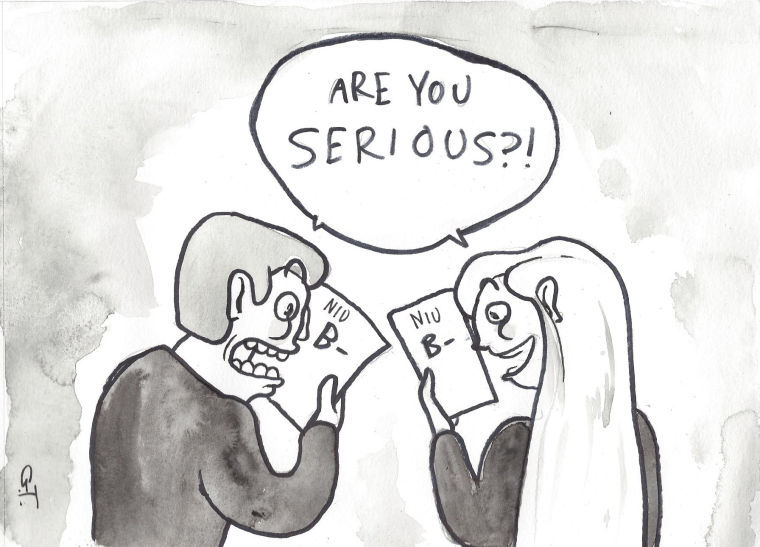Plus/minus grading no friend to A students
January 16, 2014
The plus/minus grading scheme gets a … B-.
For the first time at NIU, students are looking back on their grades from the fall and are seeing plus and minus symbols after their letter grades.
For many people, myself included, this change doesn’t sit well.
While the average GPA for students as a whole probably didn’t drop much, common sense and a little research suggests the hardest workers are the ones being penalized most by the switch.
Junior marketing major Nick Acosta was one of many students who didn’t support the change.
“Personally, I am an A student, and so it really doesn’t do anything for me, but [it] hurts me,” Acosta said.
My problem with the format is that A students get hit the hardest, which narrows the gap between them and everyone else. If NIU wants to maintain or improve its reputation, its faculty and staff should be rewarding and featuring the hardest working students, not punishing them and clumping them with the masses.
Without the addition of an A+ grade, the only direction for regular A students to go is down because a 92 percent this semester translates to a lower GPA than a 92 percent last spring. On the other hand, an 87 percent this semester provides a higher GPA than an 87 percent last spring.
Speaking plainly, B students and C students have the opportunity to improve their GPA, while straight A students receive no such benefit.
For example, there were two classes in which I had a high enough percentage to receive an A+ if it existed. Because this grade was not implemented with the other additions, my relative GPA in comparison to other students’ was lower.
Dillon Domke, Student Association Senate speaker, was also disappointed with the transition.
“I liked the old way better because the A’s that I’m getting generally are like 91, 92 percents. I’m not getting perfect or near-perfect scores on tests, exams, quizzes,” Domke said. “If you’re the kind of student that’s getting 98, 99 percents, then yeah, it’s great.”
In reality, the majority of A students will indeed not get perfect scores on everything throughout a semester. Under the new semester, this means they’re likely going to get several A-’s that would’ve been A’s last semester.
If a student does manage to pull off a 97 percent or higher, he or she should be awarded with a higher GPA. This isn’t the only flaw in the system.
“I didn’t like [the new system] because it left it up to the specific professors whether or not they wanted to use it,” Domke said.
“It wasn’t like it was mandatory across the board — you’ll get some classes that will use it and some classes that don’t.”
This means two students could earn the same final percentage in two separate classes with one student getting a higher grade and thus a higher GPA than the other.
“If there’s teachers still doing the regular system and there’s others doing the plus/minus, it’s like you’re drawing out of a hat for your fate for your GPA,” Acosta said.
Luck of the draw isn’t exactly consistent with the “grades are earned, not given” concept teachers love to stress.
Of course, there are supporters of the adjustment.
“I’m happy that we made the change,” said Sheila Barrett, assistant professor of health and human sciences. “It should be more motivating if they want to get to the higher [grade].”
The way I see it, students should be motivated by a desire to gain knowledge for their professions.
I don’t need a fear of decline in GPA to encourage me to work harder.
I see this system as severely flawed and unfair. It punishes the top students by its neglecting of an A+, it gives unheralded advantages to students in classes still using the old scheme, and it causes unneeded stress which distracts from the purpose of education.
Students should push to bring the old system back, or, at the very least, ask for one mandatory scheme for every class, eliminating the unfair disparity.
NIU President Doug Baker has noted his eagerness to hear from students and voice their opinion.
If the SA Senate backs this and students don’t stay quiet, administration has to listen.







